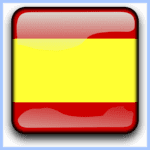We begin from the first-person singular in the present, i.e. “yo duermo”, and we extract the stem “duerm-”.
Then, the appropritae suffix is added for verbs with an "-ir" ending.
| yo |
-a |
| tú |
-as |
| él/ella/usted |
-a |
| nosotros/-as |
-amos |
| vosotros/-as |
-áis |
| ellos/ellas/ustedes |
-an |
It is important that you remember to use the stem from the first-person singular in the present, not the stem from the infinitive. This is especially important with verbs irregular in the first person present. In this example, use the stem from “yo duermo”, that is "duerm-".
Notice that “dormir” changes the conjugation stem in the “nosotros/-as” and “vosotros/-as” forms.
Because we start the conjugation from the stem of the “yo” form of the present indicative, the present subjunctive carries over the same stem change: “o” to “ue”. To form the present subjunctive, the “nosotros/-as” and “vosotros/-as” forms use the stem after removing these changes. Sometimes a slight change is applied, such as using the stem “durm-” instead of “dorm-” with the verb “dormir”.
We begin from the first-person singular in the present, i.e. “yo duermo”, and we extract the stem “duerm-”.
Then, the appropritae suffix is added for verbs with an "-ir" ending.
| yo |
-a |
| tú |
-as |
| él/ella/usted |
-a |
| nosotros/-as |
-amos |
| vosotros/-as |
-áis |
| ellos/ellas/ustedes |
-an |
It is important that you remember to use the stem from the first-person singular in the present, not the stem from the infinitive. This is especially important with verbs irregular in the first person present. In this example, use the stem from “yo duermo”, that is "duerm-".
Notice that “dormir” changes the conjugation stem in the “nosotros/-as” and “vosotros/-as” forms.
Because we start the conjugation from the stem of the “yo” form of the present indicative, the present subjunctive carries over the same stem change: “o” to “ue”. To form the present subjunctive, the “nosotros/-as” and “vosotros/-as” forms use the stem after removing these changes. Sometimes a slight change is applied, such as using the stem “durm-” instead of “dorm-” with the verb “dormir”.










